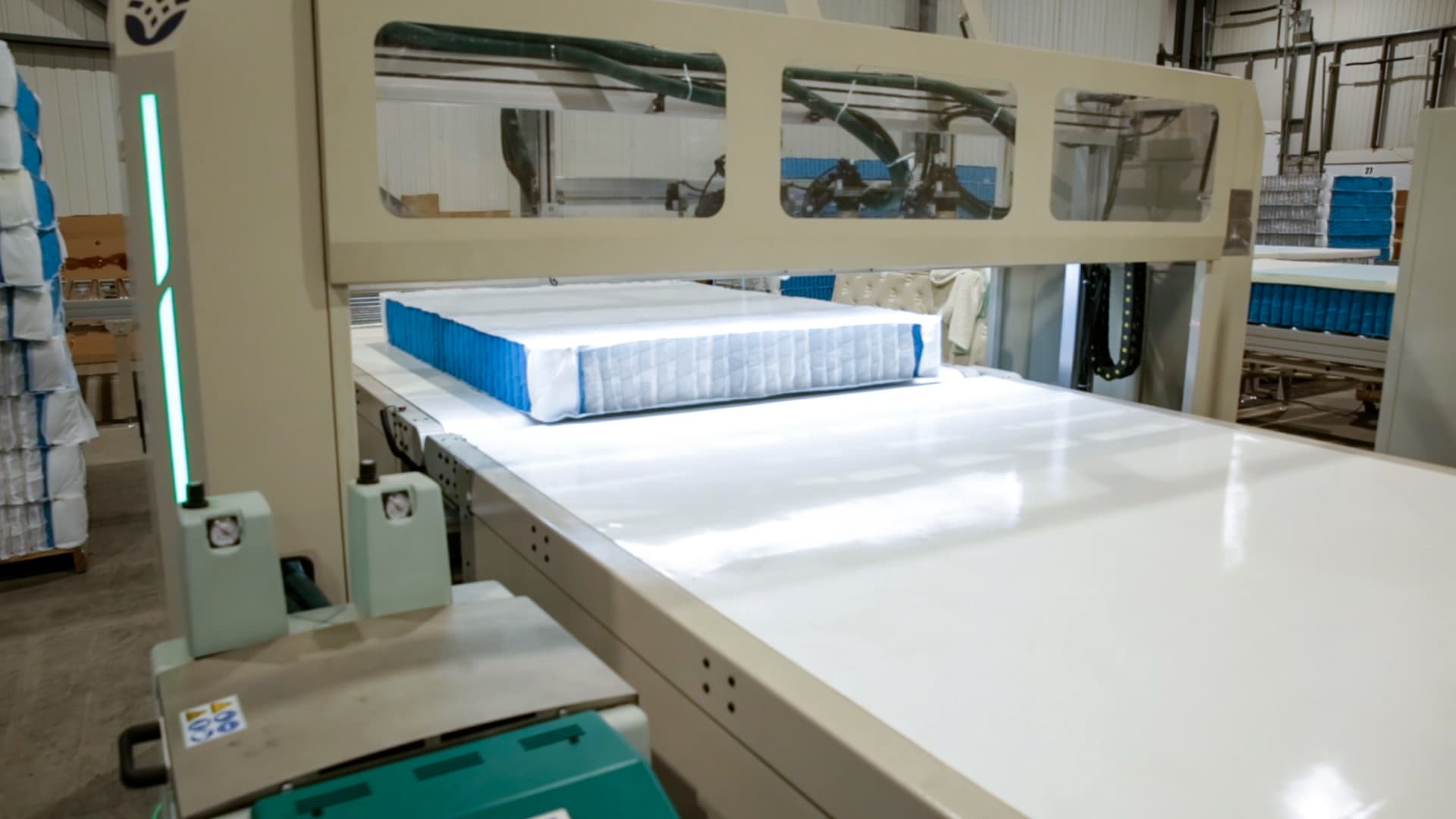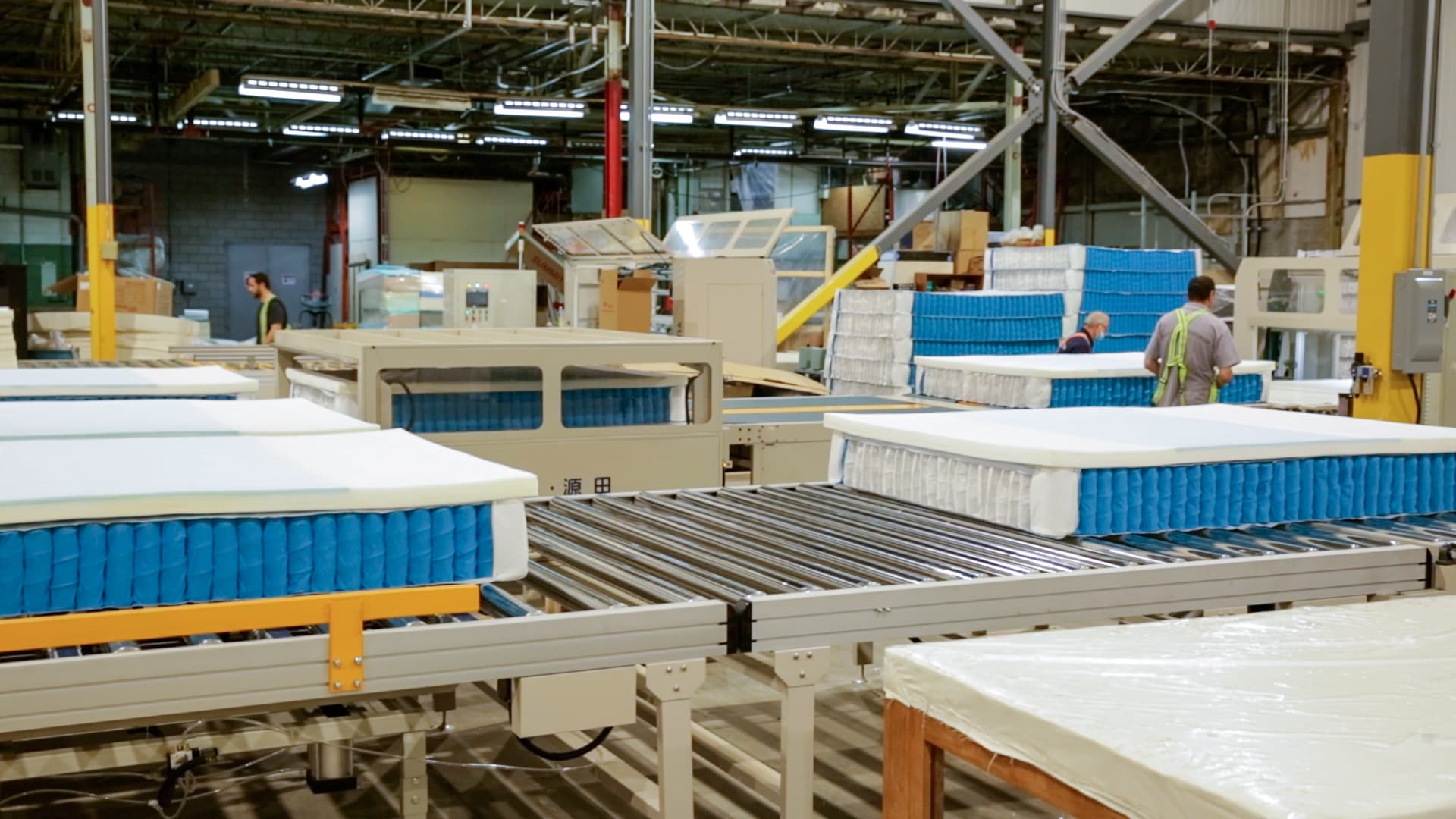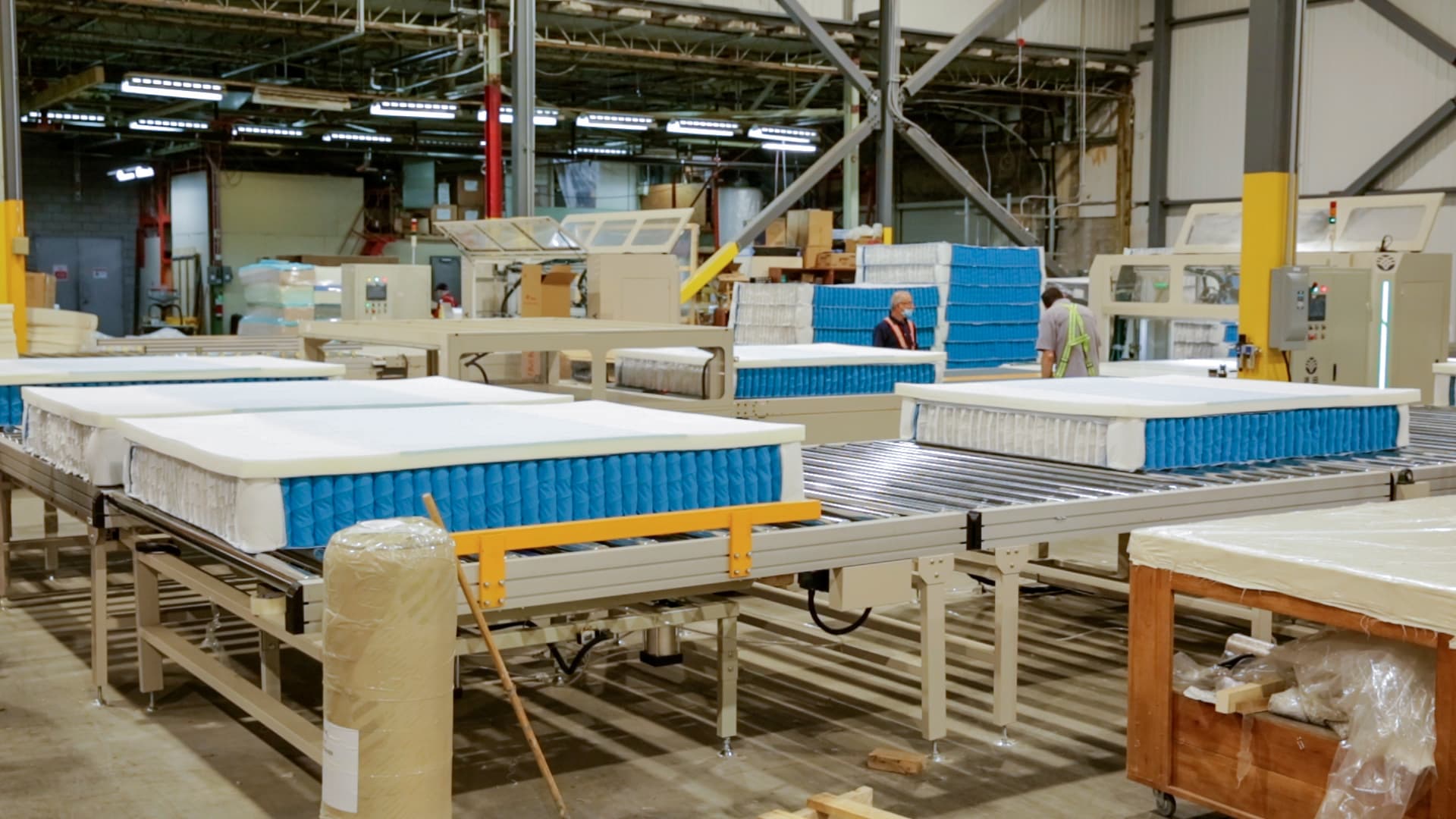
About Us
 George Itzkovitz,
George Itzkovitz,President and CEO
Primo International is a leading Canadian importer of fine quality leather and fabric upholstery, bedding, home furnishings and décor. In addition, Primo strives to manufacture high-quality product while ensuring the highest level of quality control, due in part to a newly acquired automatized production line. Founded and headquartered in Montreal, Quebec, Primo International is a family run business, led by its President and CEO, George Itzkovitz.
Our steady growth and success is a direct result of our dedication to building strong alliances with our customers and suppliers from around the world. As a company that prides itself on treating its clients with honesty, fairness, and respect, we committed to offering the highest standard of products and designs, while maintaining competitive industry prices.
With two warehouses in Montreal, totalling 500,000 sq.ft., as well as in California and North Carolina, we are able to efficiently service all North America with ease. With permanent showrooms in three major North American cities, we are also an established participant at furniture trade shows across North America.
At Primo International, our staff of over 250 dedicated employees worldwide continues to grow thanks to the shared vision and hard work of our teams.
Primo International is also a Tier II Validated Customs-Trade Partnership Against Terrorism (C-TPAT) Member. C-TPAT is an innovative government/private sector partnership program that secures the importing and exporting of goods, which results in the reduction of lead time to our customers.
OUR MISSION
Our mission is to remain committed to providing our customers with exciting and innovative quality made products at competitive prices. We, at Primo International, are devoted to the highest level of service possible and firmly believe in the fair, ethical and equal treatment of our valued clients, team members and suppliers.
 Hyman Itzkovitz,
Hyman Itzkovitz,Founder
“What makes this company successful is that we are a family that shares a vision. Every day, we work together to realize that vision. When you do that, you are a strong company.”
Automatized Production Line








Dear Customers and Suppliers,
The Customs Trade Partnership Against Terrorism (“CTPAT”) program is a supply-chain security program instigated by U.S. Customs and Border Protection to work with US importers of record, exporters, logistic providers and manufacturers to reduce the risks posed to the supply chain from terrorism and other criminal activities.
As a proud member of the U.S. Customs and Border Protection (CBP) CTPAT program since August 2, 2005; supply chain security continues to be an integral part of Primo International’s culture and business processes.
As an active CTPAT validated member, Primo International has developed, and maintains, a multi-layered security program that is consistent with the CTPAT minimum-security criteria (MSC) and remains committed to protecting our organization and supply chain from any illegal or illicit activities.
CTPAT responsibilities touch on virtually every department at Primo including our North Carolina and California distribution centers and regional offices in Vietnam and China; Primo has assembled a team of employees from Human Resources, Facilities Management, Health and Safety, Quality Management, Logistics, and Information Technology to work together to communicate and implement CTPAT principals throughout our organization. Primo International understands that threats to supply chain security evolve and therefore the teams review and update our security procedures regularly.
At Primo International we understand that our company is only one of many who are included in our supply chain and feel that security is everyone’s responsibility. As such, all employees and business partners, including contractors, service providers, and visitors are educated and must comply with the company’s CTPAT policies and procedures that are in place at each facility.
Primo International’s management gives its full support to the CTPAT team and its efforts to ensure that our supply chain and our business remain safe and secure for all Primo’s stakeholders.
Sincerely, Primo International Inc. George Itzkovitz President and Chief Executive Officer

Primo International: Modern Slavery Act Report
Introduction
Primo Bedding Company Inc (business number 104302609), dba Primo International or Primo, is a company constituted in accordance with the Business Corporations Act (Quebec) is pleased to share its annual report pursuant to section 11(1) of the Fighting Against Forced Labour and Child Labour in Supply Chains Act (the “Act”) for its financial reporting year ended November 30, 2023 which represents the company’s inaugural report under the Act.
Primo is committed to maintaining the highest standards of legal and ethical conduct, actively respecting and upholding human rights in all its business practices. Accordingly, Primo enforces a zero-tolerance policy against the use of child and forced labor within its operations and supply chains.
As a distinguished corporation dedicated to leading in ethical practices and social responsibility, Primo fully supports the objectives of the Act. Primo is devoted to ensuring transparency and accountability throughout its supply chains and proactively seeks to identify and eradicate any instances of modern slavery. Through comprehensive due diligence procedures, ongoing monitoring, and collaboration with stakeholders, Primo is committed to upholding the principles of dignity, equality, and human rights across all facets of its operations.
Structure, Activities, and Supply Chains
Primo International is a leading Canadian importer of fine quality leather and fabric upholstery, bedding, home furnishings and décor. Founded and headquartered in Montreal, Quebec, Primo International is a family run business, led by its President and CEO, George Itzkovitz.
At Primo International, our staff of over 250 dedicated employees worldwide continues to grow thanks to the shared vision and hard work of our teams.
Primo International is also a Tier II Validated Customs-Trade Partnership Against Terrorism (C-TPAT) Member. C-TPAT is an innovative government/private sector partnership program that secures the importing and exporting of goods.
We, at Primo International, are devoted to the highest level of service possible and firmly believe in the fair, ethical and equal treatment of our valued clients, team members and suppliers.
Primo operates a business establishment, conducts activities, and owns assets in Canada and meets the two size-related criteria for its previous two financial years: possessing assets worth at least $20 million, generating a minimum of $40 million in revenue.
Purchasing Decisions and Processes
Primo implements rigorous purchasing decisions and selection processes, incorporating multiple key considerations when choosing suppliers. These considerations include, but are not limited to, product quality, technical specifications, aesthetics, pricing (including delivery costs), delivery time and terms, supplier reliability, minimum quantity requirements, product development/new technologies.
Supply Chain Composition
The supply chain of Primo is supported by a network of major manufacturers with whom it has established long-standing business relationships. Primo does not rely on any single supplier. We will continue to implement our procurement policy, which involves sourcing from a diverse array of suppliers.
The Company has established specific standards for quality, safety, labor practices, environmental stewardship, and ethical business operations. Vendors are expected to conduct their businesses with integrity and comply with all applicable laws and regulations, as well as the Company’s Vendor Code of Conduct. The Company will not knowingly engage with any vendor that fails to meet the relevant legal requirements and the core standards outlined in the Vendor Code of Conduct.
Merchandise is sourced from various countries around the globe, including the United States, Italy, UK, Vietnam, China, Malaysia, Thailand and India.
Efforts to Prevent Forced and Child Labour
Primo has undertaken several initiatives to mitigate and eliminate the risk of forced and child labor within its supply chains:
– Mapping Supply Chains
Primo has compiled a comprehensive list of all suppliers and their locations to identify potential high-risk countries. All suppliers are required to sign and adhere to Primo’s Supplier Code of Conduct, and direct source factories must complete social audits based on frameworks such as the Business Social Compliance Initiative (BSCI), Worldwide Responsible Accredited Production (WRAP), or the Supplier Ethical Data Exchange (SMETA) or the equivalent certification.
– Internal Risk Assessment
Primo with its compliance team conducts thorough internal assessments to evaluate the risks of forced and child labor within its activities and supply chains. Compliance with both the internal Code and Supplier Code is enforced through audit mechanisms aimed at ensuring adherence to standards regarding forced and child labor.
Efforts to Prevent and Reduce Forced and Child Labour
Primo has implemented a comprehensive approach to mitigate and eliminate forced and child labor risks within its operations and supply chains through the following measures:
-External Risk Assessments
Primo prioritizes conducting business with vendors which has employed external assessments for evaluating the risks of forced and child labor within its activities and supply chains. High-quality social and labor audits, alongside other monitoring activities, are conducted utilizing the Business Social Compliance Initiative (BSCI), Worldwide Responsible Accredited Production (WRAP), and Supplier Ethical Data Exchange (SMETA) frameworks.
–Due Diligence Policies and Processes
Primo has developed and implemented robust due diligence policies and processes designed to identify, address, and prevent the use of forced and child labor. Primo’s Supplier Code mandates adherence to high ethical standards by suppliers, including the prohibition of modern slavery. Primo conducts annual social audits and in-person factory visits to verify compliance.
-Supplier Requirements
Suppliers are required to establish policies and procedures aimed at identifying and prohibiting the use of forced and child labor within their activities and supply chains. The Supplier Code strictly prohibits any form of modern slavery.
-Child Protection Policies
The Supplier Code bans child labor, mandating that all team members and contractors must be at least the age at which compulsory schooling ends (except in cases of student employment allowed by local laws) or the minimum age specified by local laws, whichever is higher.
-Contractual Clauses
The Supplier Code includes specific clauses to prevent the use of forced and child labor, ensuring contractual compliance.
-Standards, Codes of Conduct, and Compliance Checklists
Both the internal Code and the Supplier Code are designed to promote ethical business conduct and advance human rights. These documents include standards, codes of conduct, and comprehensive compliance checklists to guide and monitor adherence.
Through these measures, Primo demonstrates its unwavering commitment to eradicating forced and child labor within its supply chains and ensuring ethical business practices throughout its operations.
Commitment to Ethical Standards and Human Rights
Primo’s Code ensures compliance with Canadian law and upholds the highest standards of human rights for all team members. The Supplier Code explicitly bans the use of forced and child labor in the activities and supply chains of its suppliers.
Key Efforts to Prevent Forced and Child Labor
–Supplier Audits & Monitoring
Primo conducts supplier audits based on the BSCI, WRAP, and SMETA frameworks, in addition to the standards set forth in the Supplier Code.
–Training and Awareness
Primo develops and implements mandatory onboarding training focused on the risks of child and forced labor for employees involved in purchasing or contracting decisions.
-Engagement with Supply Chain Partners
Primo engages actively with supply chain partners to address issues related to forced and child labor. During initial discussions with potential suppliers, the Supplier Code is presented and must be certified by the supplier as part of the business relationship initiation process.
These actions underscore Primo’s dedication to eradicating forced and child labor in its supply chains and ensuring the maintenance of high ethical standards across its operations.
Policies and Due Diligence Processes
Primo’s governance standards create the foundation for its policies aimed at proactively identifying and addressing the risks of child and forced labor. Recognizing the inherent risks of modern slavery within global supply chains, Primo understands that complex networks and opaque practices can conceal exploitation, making vigilance crucial for businesses committed to ethical practices.
Key Components of Primo’s Policies and Due Diligence Processes
- Proactive Risk Identification and Management:
– Governance Standards: Primo’s governance standards guide its policies to identify and address emerging and existing risks related to child and forced labor.
– Recognition of Risks: Primo understands the potential for modern slavery within global supply chains and the importance of continuous vigilance to uncover exploitation.
- Ethical Sourcing Commitment:
– Dedication to Ethical Sourcing: Primo is deeply committed to ethical sourcing and corporate integrity, recognizing the necessity of addressing labor risks head-on.
- Multifaceted Approach:
– Supplier Education: Primo educates suppliers on the importance of ethical practices and fosters a culture of accountability and transparency.
– Certification and Documentation: Every new vendor relationship requires comprehensive reviews and signed documentation, including certification in the Supplier Code.
- Social Audits and Monitoring:
– Social Audits: Primo conducts thorough social audits to assess and ensure ethical practices in its supply chains.
– Supplier Assessments: Regular assessments of suppliers help identify and mitigate risks of modern slavery.
– Ongoing Monitoring: Continuous monitoring of supply chain practices ensures ongoing compliance and risk management.
- Engagement and Transparency:
– Internal and External Engagement: Primo engages with internal teams, local vendors, and overseas suppliers to promote transparency and ethical standards.
– Promotion of Ethical Standards: The engagement emphasizes the importance of maintaining high ethical standards and compliance with legal and international labor standards.
- Policy and Management System Integration:
– Embedding Responsible Business Conduct: Primo integrates responsible business conduct into its policies and management systems to ensure implementation and track results.
Through these comprehensive policies and due diligence processes, Primo actively works to identify, mitigate, and address the risks of modern slavery, fostering a transparent, ethical, and responsible supply chain network.
Code of Conduct
PRIMO’s Code of Conduct (the “Code”) represents a cornerstone of Primo’s commitment to ethical practices and human rights across all its operations. This Code is meticulously reviewed and updated regularly and is applicable to all subsidiaries, employees, and contract workers. Every team member of Primo is required to complete an annual acknowledgment and confirmation that they have read and understood the Code in a timely manner.
Key Aspects of the Code of Conduct
- Scope and Applicability:
– Universal Application: The Code applies to all subsidiaries, employees, and contract workers within Primo.
– Annual Acknowledgment: All team members must acknowledge and confirm their understanding of the Code annually.
- Human Rights and Work Environment:
– Protection of Human Rights: The Code enshrines the responsibility of Primo to respect and protect the human rights of associates, customers, and partners through formal policies.
– Safe and Respectful Workplace: It outlines standards to ensure a safe and respectful work environment, aiming to meet or exceed human rights legislation standards in all operating Provinces.
- Health and Safety Compliance:
– Health and Safety Policy: The Code includes Primo’s health and safety policy, committing to maintaining a healthy work environment and compliance with occupational health and safety legislation.
- Robust Reporting Mechanism:
– Addressing Violations: The Code provides a comprehensive reporting system for team members to report ethical or legal violations, or any other concerns.
– Reporting Channels: Team members can report suspected breaches to their manager, a member of the management team, the regional human resources manager, or Compliance and Internal Controls.
– Anonymous Reporting: An anonymous whistle-blower hotline is available for those who wish to report infractions without revealing their identity.
- Non-compliance and Corrective Actions:
– Response to Non-compliance: In the event of non-compliance, Primo commits to developing and implementing a corrective plan to address and remedy the situation.
- Communication Strategy:
– Clear Communication: A clear communication strategy is in place to ensure team members are aware of how and where to report suspected breaches of the Code.
By adhering to the Code of Conduct, Primo ensures that all team members are aligned with its commitment to ethical behavior, human rights, and the creation of a safe and respectful work environment. The comprehensive policies and reporting mechanisms outlined in the Code empower team members to actively participate in maintaining high ethical standards and address any concerns that may arise.
Supplier Code of Conduct
PRIMO’s Supplier Code of Conduct (the “Supplier Code”) is a commitment to conducting business ethically, in a socially responsible and environmentally sustainable manner, and in compliance with the highest industry standards and all applicable laws, regulations, and codes. This Supplier Code extends these high standards to all suppliers, both domestic and international.
Key Provisions of the Supplier Code of Conduct
- Ethical and Legal Compliance:
– Industry Standards and Regulations: Suppliers are required to adhere to the highest industry standards and comply with all relevant laws, regulations, and codes.
- Quality, Safety, and Environmental Compliance:
– Product and Service Standards: Suppliers must meet Primo’s demanding specifications for quality, safety, and environmental compliance in all products and services provided.
- Workplace Standards:
– Forced Labour Prohibition: The Supplier Code explicitly prohibits all forms of forced labour.
– All workers, whether employees or contractors, must be voluntarily employed.
– Suppliers must respect the right of employees to freely choose their employment.
– Any form of forced labour, including that involving prisoners or indentured workers, is strictly forbidden.
– Child Labour Prohibition: The Supplier Code strictly forbids the use of child labour in any part of the supply chain.
- General Ethical Business Practices:
– Business Integrity: Suppliers are expected to conduct their business in an ethical manner, maintaining integrity and transparency in all dealings.
- Sub-contractors and Sub-suppliers:
– Compliance Down the Chain: Suppliers must ensure that their subcontractors and sub-suppliers also comply with the requirements of the Supplier Code.
Detailed Prohibition Against Forced Labour
No Forced Labour Clause:
All workers (whether employees or contractors) must be voluntary, and you are required to respect the right of employees to decide to work or not. Suppliers must not use forced labour of any kind, whether they be prisoners, indentured workers, or otherwise.
By adhering to these stringent guidelines, Primo ensures that its suppliers maintain ethical practices and meet high standards of social responsibility and environmental sustainability. The Supplier Code underscores Primo’s unwavering dedication to protecting human rights, ensuring workplace safety, and promoting ethical business conduct throughout its supply chain.
No Child Labour
PRIMO, through its Supplier Code of Conduct, sets stringent standards prohibiting the use of child labour across all operations of its suppliers and their sub-suppliers. These guidelines ensure that all employees and contractors meet minimum age requirements and that child labour regulations are strictly followed to protect the rights and well-being of young individuals.
Key Provisions Against Child Labour
- Mandatory Age Requirements:
– Minimum Age Compliance: Suppliers and their sub-suppliers must ensure that employees and contractors are at least:
– The age at which compulsory schooling has ended, OR
– The minimum age mandated by local laws,
– Whichever is greater, but in all cases, at least 14 years of age,
– With the exception of student employment allowed by local laws.
- Definition and Compliance:
– Compliance with Local and International Laws: Primo adheres to the definition of child labour provided by domestic and international standards:
– Labour that is illegal under Canadian law.
– Labour under mentally, physically, socially, or morally dangerous conditions.
– Labour that interferes with schooling.
– The worst forms of child labour as defined in the Worst Forms of Child Labour Convention, 1999.
- Ongoing Policy Review:
– Consultation and Revisions: Primo is actively consulting industry professionals and considering revisions to the Supplier Code. These revisions will clarify instances where employment of individuals under 18 may be acceptable, in accordance with legal and ethical considerations.
Supplier Commitment and Compliance
- Agreement to Strict Compliance:
– Certification Requirement: All suppliers must review and strictly comply with the Supplier Code. This compliance is formalized through:
– Completing a form, OR
– Signing an agreement incorporating the Supplier Code.
– Re-certification: Suppliers may be required to re-certify compliance with the Supplier Code upon Primo’s request.
- 100% Supplier Sign-on:
– Current Compliance: As of the date of this report, 100% of suppliers and strategic partners have signed the Supplier Code, demonstrating full commitment to these standards.
- Monitoring and Verification:
– Periodic Monitoring: The Supplier Code mandates periodic monitoring and verification of compliance, including:
– Providing Primo with reasonable access to facilities, records, and workers for compliance inspections.
– Verification Process: This ensures ongoing adherence to the defined standards and helps identify and rectify any compliance issues promptly.
By instituting these rigorous standards and monitoring mechanisms, Primo emphasizes its dedication to ethical practices and the prevention of child labour in its supply chain. These efforts uphold the Group’s commitment to protecting young individuals and ensuring all labor practices meet the highest ethical and legal standards.
Supplier Code of Conduct: Compliance and Enforcement
Audit and Inspection Protocol
- Annual Audits:
– Frequency of Audits: Primo or its agents may conduct audits of the supplier’s premises:
– Once per calendar year, OR
– More frequently, if Primo reasonably suspects a compliance issue.
– Notice Requirement: Suppliers will be given 120 hours’ written notice prior to the audit.
– Audit Timing: Audits will be conducted during normal business hours.
- Non-Compliance Response:
– Remedial Action: If a supplier fails to comply with the Supplier Code or does not promptly remedy an infraction:
– Primo reserves the right to cancel purchase orders.
– Primo may also terminate contracts or business relationships with the non-compliant supplier.
Reporting Violations
- Encouraging Reporting:
– Whistleblower Policy: The Supplier Code encourages individuals to report any past or emerging violations.
– Reporting Channel: Reports should be directed to the Vice President of Compliance of Primo.
- Investigation and Action:
– Prompt Investigation: Primo will promptly investigate any reported violations.
– Appropriate Actions: Based on the investigation results, Primo will take necessary and appropriate steps to address the violations.
Manufacturing Agreements
- Supply Chain Composition:
– Primo’s supply chain consists of:
– Wholesalers primarily located in Canada.
– Factories that manufacture goods both in Canada and overseas.
- Supplier Code Adherence:
– Mandatory Sign-On: Both wholesalers and factories are required to sign the Supplier Code.
- Additional Requirements for Factories:
– Social Audits: Factories that manufacture goods must also undergo social audits to ensure compliance with ethical standards.
– Multiple Agreements: Each agreement established between a supplier and Primo entity is referred to as a “Manufacturing Agreement.” Collectively, these agreements are termed “Manufacturing Agreements.”
Summary
In summary, Primo’s Supplier Code of Conduct establishes robust mechanisms for monitoring and ensuring compliance with ethical, legal, and environmental standards. Through regular audits, clear non-compliance penalties, and encouraging proactive reporting of violations, Primo aims to maintain a sustainable and ethically responsible supply chain. Factories, as a significant part of the supply chain, are held to additional scrutiny through mandatory social audits and formalized Manufacturing Agreements to further reinforce the Group’s commitment to responsible manufacturing practices.
Manufacturing Agreement Requirements
Compliance Assurance
- Supplier Representations and Warranties:
– Standards Adherence: Suppliers must represent and warrant that they will comply with the standards of the contracting Primo member in relation to:
– Equipment
– Facilities
– Personnel
– Products
– Evidence of Compliance: Suppliers must, upon reasonable request, provide evidence of such compliance to the contracting Primo member.
Inspection and Audit Rights
- Inspection Access:
– Notice Period: Upon 24 hours’ notice to the supplier, Primo member is granted access to:
– All equipment
– All facilities
– All operations
– Scope of Access: This access pertains to all aspects relating to the manufacture, processing, packaging, or distribution of products for the purpose of inspection and audits.
Legal Compliance
- Regulatory Adherence:
– Comprehensive Compliance: Suppliers must comply with all applicable federal, state, provincial, and local laws, rules, and regulations. This includes, but is not limited to, regulations related to:
– Importation
– Manufacture
– Shipment
– Sale
– Use
– Performance
– Safety
– Branding
– Packaging
– Labelling
Supplier Code Integration
- Incorporation by Reference:
– Attachment and Reference: The Manufacturing Agreements incorporate the Supplier Code by reference, including it as a schedule attached to the agreement.
– Certification and Compliance: Suppliers are required to:
– Read the Supplier Code.
– Certify their compliance.
– Undertake to remain in continual compliance with the Supplier Code.
Summary of Manufacturing Agreement Obligations
Under the Manufacturing Agreements, suppliers are bound by a comprehensive set of obligations designed to ensure strict adherence to ethical and legal standards. Key requirements include:
– Compliance with Standards: Suppliers must adhere to the standards related to equipment, facilities, personnel, and products as set by the contracting Primo member.
– Evidence Provision: Suppliers must provide evidence of compliance upon request.
– Inspection Rights: Primo member retains the right to inspect and audit supplier operations with 24 hours’ notice.
– Legal Compliance: Suppliers must comply with all relevant laws and regulations governing various aspects of product handling and distribution.
– Supplier Code Compliance: The Supplier Code is seamlessly integrated into the Manufacturing Agreement, necessitating that suppliers read, certify, and continually comply with its provisions.
By embedding these rigorous obligations within the Manufacturing Agreements, Primo ensures that its suppliers maintain the highest levels of compliance with both internal standards and external regulations, fostering a responsible and ethically sound supply chain.
Addressing Forced Labour and Child Labour Risks
Supply Chain Complexity and Transparency Efforts
- Supply Chain Complexity:
– Growth and Initiatives: Primo is experiencing rapid growth with multiple ongoing initiatives that enlarge its supply chains.
– Scope: The supply chains involve numerous domestic wholesalers and importers across various corporations.
- Transparency Challenges:
– Visibility Issues: Primo acknowledges the difficulties in maintaining visibility throughout its extensive supply chains, which impedes the ability to fully monitor and control for potential risks such as forced or child labour.
Risk Identification and Mitigation Strategies
- Third-Party Vetting and Spot Checks:
– Initiative Start: Beginning in 2024, Primo is enlisting third-party providers to conduct spot checks specifically aimed at suppliers situated in highly exposed countries.
– Objective: The goal is to identify and address potential risks relating to forced and child labour within the supply chains.
- Current Risk Landscape:
– Identified Risks: Risks of forced and child labour have been identified in Primo’s supply chains.
– Ongoing Monitoring: Continuous efforts are being made to recognize emerging risks.
- Transparency in Domestic Supply Chains:
– Challenges: There remains limited transparency in identifying and addressing modern slavery and human rights issues within domestic wholesalers and importers.
– Mitigation Measures:
– The Supplier Code explicitly prohibits the use of child and forced labour.
– An audit mechanism is embedded within the Supplier Code to assess and ensure suppliers’ compliance.
Audit Results and Measures Taken
- Audit Performance:
– Track Record: In the past year, Primo has conducted audits across its suppliers.
– Outcomes: No infractions have been identified through these audits, indicating compliance with the Supplier Code.
Identified Risk Areas in Manufacturing
- Risk Areas:
– Sector-Specific Risks: The manufacturing industry has been flagged for potential risks of forced and child labour.
– Ongoing Identification: Specific areas within the manufacturing industry that carry higher risks of child and forced labour are continually being identified and monitored.
Summary
Primo is proactive in addressing the risks of forced and child labour within its extensive and complex supply chains. Despite facing challenges related to transparency, particularly with overseas manufacturers, Primo has implemented several key measures to mitigate these risks:
– Third-Party Spot Checks: Engaging third-party providers to conduct spot checks in vulnerable regions.
– Supplier Code Enforcement: Instituting a Supplier Code that explicitly prohibits child and forced labour.
– Audit Mechanisms: Performing comprehensive audits to ensure adherence to the Supplier Code.
– Continuous Monitoring and Identification: Sustained efforts to identify emerging risks and specific areas prone to ethical concerns within the supply chain.
These initiatives reflect Primo’s commitment to ethical sourcing and human rights protections, striving to maintain a responsible and transparent supply chain despite inherent challenges.
Forced Labour and Child Labour Risks in Primo’s Supply Chain
Product and Supplier Risk Mitigation
- Furniture Manufacturing Industry:
– Risk Factors: The furniture manufacturing industry notably carries a higher risk of forced and child labour.
– Mitigation Strategies:
– Supplier Certification: Suppliers are required to provide certifications to prove compliance with ethical standards.
– Supplier Visits: Regular visits to tier-two suppliers, including weavers and dyeing facilities, are conducted to ensure adherence.
– Supplier Code: All suppliers are mandated to sign onto and adhere to the Supplier Code, which prohibits forced and child labour.
- Tier Three Suppliers:
– Risk Management Efforts:
– Best Efforts: Primo endeavors to reduce risks associated with tier three suppliers, despite challenges in monitoring, authenticating, and maintaining visibility.
– Supplier Code Enforcement: Requiring tier three suppliers to sign and comply with the Supplier Code.
– Consultation with Experts: Engaging industry experts to enhance monitoring practices and develop improved methods for overseeing tier three suppliers.
- Suppliers Beyond Tier Three:
– Monitoring Challenges:
– Visibility Issues: Primo acknowledges difficulties in monitoring suppliers beyond tier two due to the complex nature of supply chains.
– Opportunities for Improvement: Primo is actively considering opportunities and methodologies to enhance visibility and control over more distant tiers of the supply chain.
Remediation Measures and Income Loss
- Instances of Forced or Child Labour:
– No Identified Cases: To date, Primo has not identified any instances of forced or child labour within its activities or supply chains.
– Remediation Actions: Consequently, no specific remediation measures have been undertaken.
- Remediation of Loss of Income:
– Impact on Vulnerable Families:
– No Loss of Income Identified: As no instances of forced or child labour have been found, Primo has not observed any resultant loss of income for vulnerable families.
– No Remediation Steps Necessary: Thus, no steps have been taken to remediate income loss, as no such loss has been identified.
Summary of Risk Mitigation and Monitoring Efforts
Primo is committed to mitigating the risks of forced and child labour throughout its supply chain. Efforts include:
– Product-Specific Measures in the Furniture Manufacturing Industry:
– Requiring supplier certifications.
– Conducting visits to tier-two suppliers.
– Enforcing adherence to the Supplier Code.
– Tier Three Supplier Efforts:
– Utilizing best efforts to ensure reduced risks despite visibility challenges.
– Requiring compliance with the Supplier Code.
– Consulting with industry experts to improve monitoring practices.
– Extended Supplier Chain Monitoring:
– Acknowledging the difficulty in monitoring beyond tier two.
– Actively considering methods to enhance supply chain visibility.
Despite the absence of identified forced or child labour cases, Primo maintains rigorous monitoring and proactive engagement with suppliers to uphold ethical sourcing practices, continually aiming to improve supply chain transparency and accountability.
Training Initiatives at Primo
Child and Forced Labour Training
- Current Training Framework:
– Target Audience: Mandatory training is specifically provided to team members involved in contracting or purchasing decisions.
– Initial Onboarding: This training is part of the onboarding process for new sourcing team members.
– Delivery Method: Currently, the training is delivered verbally and informally.
- Future Training Enhancements:
– Investigation of Specialized Training: Primo is exploring specialized training programs specifically focused on child and forced labour.
– Objectives:
– Codification: To formalize and structure the existing informal training.
– Expansion: To increase the scope of training, potentially including a broader range of team members beyond the sourcing team.
General Training to Support the Code
- Training Objectives:
– High Standards of Ethics and Human Rights: Training supports the principles enshrined in the Supplier Code, emphasizing the importance of ethics and human rights.
– Continual Reinforcement: Training commences on an employee’s first day and continues throughout their employment.
- Training Delivery Methods:
– Formal Training: Structured, scheduled training sessions.
– Informal Training: Ongoing, ad-hoc training opportunities.
– Social Channels: Peer learning and social interaction to reinforce training principles.
- Training Program Goals:
– Skill Development: Equip employees with the necessary skills to conduct themselves respectfully, safely, transparently, and fairly.
– Principles of the Code: Ensure that all employees uphold the principles outlined in the Supplier Code.
Comprehensive Training Topics
- Diversity, Equity, Inclusion, and Belonging: Training to foster an inclusive and equitable work environment.
- Mitigating Bias: Identifying and addressing unconscious biases in the workplace.
- Respect in the Workplace: Promoting a culture of respect among all employees.
- Workplace Violence, Discrimination, and Harassment: Preventing and responding to incidents of workplace violence, discrimination, and harassment.
- Workplace Hazardous Materials Information System (WHMIS): Ensuring safe handling and awareness of hazardous materials.
- Health and Safety: Promoting health and safety practices to prevent workplace accidents and injuries.
- Information Technology Security Awareness: Training on protecting company data and maintaining IT security.
Additional Training Resources
- Resource Centre:
– Access to Information: Employees have access to a Resource Centre offering a wealth of information aligned with the Code’s principles.
– On-Demand Learning Providers: Availability of on-demand learning opportunities to further explore methods of working in alignment with the Code.
Summary
Primo is committed to comprehensive training programs that align with and support the principles of its Supplier Code. These programs focus on:
– Mandatory Training for Sourcing Team Members: Specific training on child and forced labour for those involved in contracting and purchasing.
– Potential Specialized Training: Investigating structured and expanded training programs to cover child and forced labour more thoroughly.
– Broad Ethical and Human Rights Training: A wide range of training programs starting from onboarding, covering various critical topics, and reinforced throughout an employee’s tenure.
– Additional Learning Resources: Providing continuous learning opportunities through a Resource Centre and on-demand training.
Through these initiatives, Primo ensures its employees are well-prepared to uphold ethical standards, foster a respectful work environment, and effectively mitigate risks associated with forced and child labour.
Assessing Effectiveness of Anti-Forced and Child Labour Measures at Primo
Internal Audit and Enterprise Risk Management
- Internal Audit Team:
– Role: The internal audit team forms a critical part of the broader enterprise risk management (ERM) framework at Primo .
– Functions:
– Review Compliance Programs: Ensure that the Group’s programs comply with relevant laws and regulations.
– Assess Ethics Policies: Evaluate and understand the company’s ethics and conduct policies, considering cultural or regional sensitivities.
– Identify Compliance Issues: Address significant compliance issues as they arise.
– Oversight for Investigations: Oversee investigations related to potential fraud or illegal acts.
- Audit Committee Duties:
– Primo’s Audit Committee:
– Reviews and understands the effectiveness of compliance programs.
– Considers significant compliance issues identified.
– Assesses the adequacy of ethics policies concerning cultural and regional sensitivities.
– Provides oversight of fraud or illegal activities investigations.
Supplier Code Adherence and Auditing
- Supplier Code:
– Standard Operating Procedure: Suppliers are required to sign and adhere to the Supplier Code.
– Internal Audit Review: The adherence to the Supplier Code by suppliers is regularly reviewed by Primo ’s internal auditing team to ensure compliance.
Ongoing and Periodic Reviews
- Review Process:
– Ongoing Reviews: Continuous assessment of the current measures to mitigate risks of forced and child labour.
– Periodical Audits: Regular audits of policies and procedures related to forced and child labour.
- Effectiveness Assessment:
– Regular and scheduled reviews or audits to ensure policies and measures are effective.
– Evaluating whether the implemented policies and procedures are successful in mitigating the risks associated with forced and child labour.
Commitment to Industry Best Practices and Ethical Standards
- Proactive Mitigation:
– Modern Slavery Risk: Proactively taking steps to mitigate risks of modern slavery within supply chains.
– Alignment with Best Practices: Striving to align with best industry practices both in Canada and globally to combat forced and child labour.
- Engagement and Advocacy:
– Domestic and International Partners: Continued active engagement with both domestic and international partners.
– Transparency and Ethical Standards: Encouraging transparency, promoting ethical standards, and advocating for responsible sourcing practices.
Summary
Primo’s approach to ensuring the effectiveness of its measures against forced and child labour involves a structured and multi-faceted framework:
– Internal Audit Team:
– Review and ensure compliance with laws and regulations.
– Assess and oversee ethics and conduct policies.
– Address significant compliance issues and oversee investigations.
– Supplier Code Adherence:
– Mandatory signing and adherence to the Supplier Code by all suppliers.
– Regular review of adherence through internal audits.
– Ongoing and Periodic Reviews:
– Continuous and periodic review and auditing of policies and procedures related to forced and child labour.
– Proactive and Industry-Aligned Actions:
– Commitment to proactive risk mitigation strategies.
– Alignment with best practices in Canada and abroad.
– Active engagement with partners to ensure transparency and promote ethical standards.
Through these comprehensive measures, Primo aims to maintain robust and effective systems to combat the risks of forced and child labour across its operations and supply chains.
Signed Attestation
This report was approved by the Board of Directors of Primo International on May 1st, 2024.
****************************
In accordance with the requirements of the Act, and in particular section 11 thereof, I attest that I have reviewed the information contained in the report for the entity or entities listed above. Based on my knowledge, and having exercised reasonable diligence, I attest that the information in the report is true, accurate and complete in all material respects for the purposes of the Act, for the reporting year listed above.
DATED as of May 2, 2024.
I have the authority to bind Primo Bedding Company Inc
Niaina Andria
Vice President of Compliance
